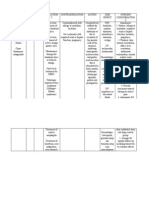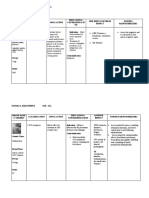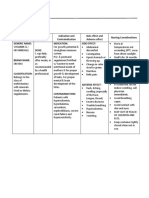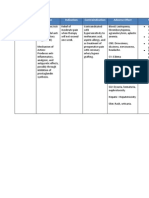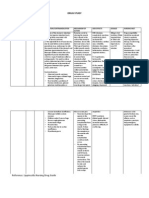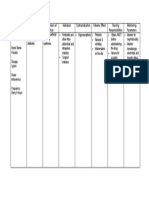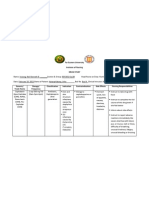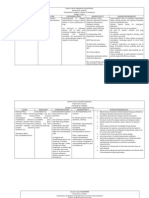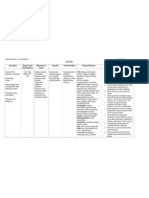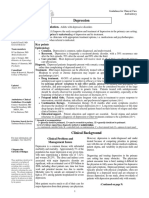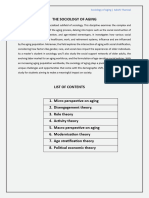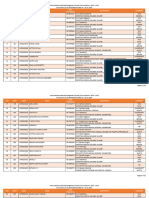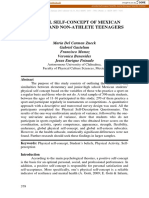0 ratings0% found this document useful (0 votes)
364 viewsDrug Study Ranitidine
Drug Study Ranitidine
Uploaded by
Tipey Segismundo1) Zantac (ranitidine) is an antisecretory drug that competitively and reversibly inhibits histamine action at H2-receptor sites on parietal cells, thus blocking gastric acid secretion.
2) It is used for the short-term treatment of active duodenal ulcer, maintenance therapy for duodenal ulcer patients after healing of acute ulcer, treatment of gastroesophageal reflux disease, short-term treatment of active, benign gastric ulcer, and treatment of pathologic GI hypersecretory conditions.
3) Potential adverse effects include headache, malaise, dizziness, somnolence, insomnia, vertigo, mental confusion, agitation, depression
Copyright:
© All Rights Reserved
Available Formats
Download as DOCX, PDF, TXT or read online from Scribd
Drug Study Ranitidine
Drug Study Ranitidine
Uploaded by
Tipey Segismundo0 ratings0% found this document useful (0 votes)
364 views2 pages1) Zantac (ranitidine) is an antisecretory drug that competitively and reversibly inhibits histamine action at H2-receptor sites on parietal cells, thus blocking gastric acid secretion.
2) It is used for the short-term treatment of active duodenal ulcer, maintenance therapy for duodenal ulcer patients after healing of acute ulcer, treatment of gastroesophageal reflux disease, short-term treatment of active, benign gastric ulcer, and treatment of pathologic GI hypersecretory conditions.
3) Potential adverse effects include headache, malaise, dizziness, somnolence, insomnia, vertigo, mental confusion, agitation, depression
Copyright
© © All Rights Reserved
Available Formats
DOCX, PDF, TXT or read online from Scribd
Share this document
Did you find this document useful?
Is this content inappropriate?
1) Zantac (ranitidine) is an antisecretory drug that competitively and reversibly inhibits histamine action at H2-receptor sites on parietal cells, thus blocking gastric acid secretion.
2) It is used for the short-term treatment of active duodenal ulcer, maintenance therapy for duodenal ulcer patients after healing of acute ulcer, treatment of gastroesophageal reflux disease, short-term treatment of active, benign gastric ulcer, and treatment of pathologic GI hypersecretory conditions.
3) Potential adverse effects include headache, malaise, dizziness, somnolence, insomnia, vertigo, mental confusion, agitation, depression
Copyright:
© All Rights Reserved
Available Formats
Download as DOCX, PDF, TXT or read online from Scribd
Download as docx, pdf, or txt
0 ratings0% found this document useful (0 votes)
364 views2 pagesDrug Study Ranitidine
Drug Study Ranitidine
Uploaded by
Tipey Segismundo1) Zantac (ranitidine) is an antisecretory drug that competitively and reversibly inhibits histamine action at H2-receptor sites on parietal cells, thus blocking gastric acid secretion.
2) It is used for the short-term treatment of active duodenal ulcer, maintenance therapy for duodenal ulcer patients after healing of acute ulcer, treatment of gastroesophageal reflux disease, short-term treatment of active, benign gastric ulcer, and treatment of pathologic GI hypersecretory conditions.
3) Potential adverse effects include headache, malaise, dizziness, somnolence, insomnia, vertigo, mental confusion, agitation, depression
Copyright:
© All Rights Reserved
Available Formats
Download as DOCX, PDF, TXT or read online from Scribd
Download as docx, pdf, or txt
You are on page 1of 2
Dose,
Name and Frequency,
Mechanism
Classification of Route, Duration Indication Contraindication Adverse Effects Nursing Responsibility
of Action
Drug of
Administration
Brand Name: Dose: Potent anti- Short-term Hypersensitivity CNS: Headache, Potential toxicity results
Zantac 50mg ulcer treatment of to malaise, dizziness, from decreased clearance
drug that active duodenal ranitidine; acute somnolence, (elimination) and therefore
Generic Name: Frequency: competitively ulcer. porphyria; OTC insomnia, vertigo, prolonged action; greatest
Ranitidine q8 and Maintenance administration in mental confusion, in the older adult patients
reversibly therapy for children agitation, or those with hepatic or
Drug Class: Route: inhibits duodenal ulcer <12 y. depression, renal dysfunction.
Antisecretory IV histamine patient after hallucinations in
action healing of acute older adults.
at H2- ulcer; treatment CV:
receptor of Bradycardia (with
sites on gastroesophagea rapid IV push).
parietal l reflux disease; GI: Constipation,
cells, thus short-term nausea, abdominal
blocking treatment of pain, diarrhea.
gastric active, benign Skin: Rash.
acid gastric ulcer; Hematologic:
secretion. treatment of Reversible
Indirectly pathologic GI decrease in WBC
reduces hypersecretory count,
pepsin conditions (e.g., thrombocytopenia.
secretion Zollinger- Body as a Whole:
but appears Ellison Hypersensitivity
to syndrome, reactions,
have minimal systemic anaphylaxis (rare).
effect on mastocytosis,
fasting and
and postoperative
postprandial hypersecretion);
serum gastrin heartburn.
concentration
s or
secretion of
gastric
intrinsic
factor or
mucus
You might also like
- ERS Handbook of Paediatric Respiratory Medicine - E. Eber, F MidullaDocument750 pagesERS Handbook of Paediatric Respiratory Medicine - E. Eber, F MidullaOlga Cîrstea100% (1)
- Drug Study (Ranitidine, Metoclopramide, Ketorolac, and Omeprazole)Document8 pagesDrug Study (Ranitidine, Metoclopramide, Ketorolac, and Omeprazole)Akisan0% (1)
- Acute Pain Nursing Care PlanDocument3 pagesAcute Pain Nursing Care PlanTipey Segismundo100% (1)
- RanitidineDocument2 pagesRanitidinecen janber cabrillosNo ratings yet
- Drug StudyDocument2 pagesDrug StudyDimple SumarcaNo ratings yet
- Patient M. G Drug 1 - Ob MaxDocument5 pagesPatient M. G Drug 1 - Ob MaxGrace MellaineNo ratings yet
- Drug Study QIDocument8 pagesDrug Study QImaeDonitaNo ratings yet
- UnasynDocument1 pageUnasynrachieeeNo ratings yet
- Senokot-S (Senna Concentrate 8.6mg + Docusate Sodium 50mg)Document2 pagesSenokot-S (Senna Concentrate 8.6mg + Docusate Sodium 50mg)E100% (1)
- Mefenamic AcidDocument1 pageMefenamic AcidChiara Tenorio Ü100% (2)
- XtendaDocument2 pagesXtendaAlexis CoronadoNo ratings yet
- Drug Study RopivacaineDocument2 pagesDrug Study Ropivacainerica sebabillonesNo ratings yet
- Drug Study - Docx HyocineDocument2 pagesDrug Study - Docx HyocineChin Chan100% (1)
- ApidraDocument4 pagesApidraRobert Ivan AgujarNo ratings yet
- CefoxitinDocument1 pageCefoxitinDaryl PaglinawanNo ratings yet
- Drug Study of Mannitol RMCDocument1 pageDrug Study of Mannitol RMCAdrian Ardamil0% (1)
- DoxofyllineDocument2 pagesDoxofylline3C LAGRANA, Rea Lyn F.No ratings yet
- Drug Study 04-21-09Document2 pagesDrug Study 04-21-09obietobiNo ratings yet
- AmpicillinDocument2 pagesAmpicillinMar OrdanzaNo ratings yet
- NCP DobDocument3 pagesNCP DobLester BuhayNo ratings yet
- Ascorbic AcidDocument2 pagesAscorbic AcidJaymark Lambino50% (2)
- Health Teaching For Infection ControlDocument2 pagesHealth Teaching For Infection ControlZaijean Kate Dianne LigutomNo ratings yet
- Name of Drug Dosage, Route & Frequency Mechanism of Action Indication Contraindication Side-Effects Nursing ResponsibilitiesDocument5 pagesName of Drug Dosage, Route & Frequency Mechanism of Action Indication Contraindication Side-Effects Nursing ResponsibilitiesDivine Grace Arreglo AbingNo ratings yet
- CalmoseptineDocument2 pagesCalmoseptineMonique Chua 蔡仁安No ratings yet
- CefazolinDocument1 pageCefazolinernestjohn67% (3)
- CEFOXITINDocument30 pagesCEFOXITINJaessa FelicianoNo ratings yet
- OB Drug Study - Mefenamic AcidDocument2 pagesOB Drug Study - Mefenamic AcidJustin Ancog100% (1)
- GliclazideDocument5 pagesGliclazideGwyn RosalesNo ratings yet
- Drug Study InsulinDocument2 pagesDrug Study InsulinGrant Kenneth Dumo AmigableNo ratings yet
- College of Nursing: Rifadin RifampinDocument4 pagesCollege of Nursing: Rifadin RifampinAnika PleñosNo ratings yet
- OMEPRAZOLEDocument1 pageOMEPRAZOLERheza0% (2)
- Co AmoxiclavDocument2 pagesCo AmoxiclavkaijeiNo ratings yet
- MefenamicDocument1 pageMefenamicChristian Clyde N. ApigoNo ratings yet
- Drug-Study-Tramadol RyreyDocument3 pagesDrug-Study-Tramadol RyreyJanelle Cabida Supnad0% (1)
- CEFUROXIMEDocument1 pageCEFUROXIMEJose Luis HernandezNo ratings yet
- Case Presentation Station 3B Drug Study AzithromycinDocument4 pagesCase Presentation Station 3B Drug Study AzithromycinhahahahaaaaaaaNo ratings yet
- Drug Study: Diphenhydramine IVDocument6 pagesDrug Study: Diphenhydramine IVMarson RosaritoNo ratings yet
- Drug Study - Betadine GargleDocument1 pageDrug Study - Betadine GargleJovelleNo ratings yet
- CefalexinDocument1 pageCefalexinKenneth InciongNo ratings yet
- Name of Drug Classification Mechanism of Action Indication Contraindicatio N Side Effects Nursing ResponsibilitiesDocument2 pagesName of Drug Classification Mechanism of Action Indication Contraindicatio N Side Effects Nursing ResponsibilitiesGwyn RosalesNo ratings yet
- KetorolacDocument1 pageKetorolacAngela Tenorio100% (1)
- Drug Study - Cefixime PDFDocument1 pageDrug Study - Cefixime PDF2C- VILLACARLOS, LEONA ROSE M.100% (1)
- Docu - Tips Drug StudyDocument14 pagesDocu - Tips Drug StudyArdel LabadaNo ratings yet
- DS (Fenofibrate)Document5 pagesDS (Fenofibrate)Mary April MendezNo ratings yet
- Dexamethasone and MgSO4Document2 pagesDexamethasone and MgSO4Nasriah MacadatoNo ratings yet
- DRUG STUDY OXYTOCIN, METHERGINE EtcDocument9 pagesDRUG STUDY OXYTOCIN, METHERGINE EtcPatricia Reese YutiamcoNo ratings yet
- Drug Study: Nursing DepartmentDocument1 pageDrug Study: Nursing Departmentgiselle chloeNo ratings yet
- DS - ColchicineDocument2 pagesDS - ColchicineMarie Kelsey Acena MacaraigNo ratings yet
- Drug Study: San Francisco St. Butuan City 8600, Region XIII Caraga, PhilippinesDocument2 pagesDrug Study: San Francisco St. Butuan City 8600, Region XIII Caraga, PhilippinesNikki Caryl ZafraNo ratings yet
- AzithromycinDocument1 pageAzithromycinjennelyn losantaNo ratings yet
- Drug Study AmpicillinDocument6 pagesDrug Study AmpicillinDgjj Compuiter100% (1)
- Drug Study NurseryDocument6 pagesDrug Study NurseryPau-pau BasiNo ratings yet
- Act Rapid 2Document2 pagesAct Rapid 2Leah Torcelino-InfanteNo ratings yet
- Drug Study Cap RHPDocument7 pagesDrug Study Cap RHPJan DeeNo ratings yet
- NalbuphineDocument5 pagesNalbuphineGab PagalilauanNo ratings yet
- Drug Study in SulbactamDocument1 pageDrug Study in SulbactamChia CordovaNo ratings yet
- Nursing Care Plan (Ineffective Breathing Pattern)Document1 pageNursing Care Plan (Ineffective Breathing Pattern)Michael Vincent DuroNo ratings yet
- Drug StudyDocument1 pageDrug StudyCuttie Anne GalangNo ratings yet
- DRUG StudyDocument8 pagesDRUG StudyRhobic ManansalaNo ratings yet
- Drug Study 1 Diazepam, Ome ChlonidineDocument4 pagesDrug Study 1 Diazepam, Ome ChlonidineLeticia ElricNo ratings yet
- Drug Study CSDocument7 pagesDrug Study CSFrancis MendozaNo ratings yet
- Drug Study (Paracetamol, PNSS and Zinc SulfateDocument5 pagesDrug Study (Paracetamol, PNSS and Zinc SulfateRhajeeb Aennas SugalaNo ratings yet
- Hyperthermia Drug StudyDocument2 pagesHyperthermia Drug StudyTipey SegismundoNo ratings yet
- Fluid Volume Deficit Nursing Care PlanDocument4 pagesFluid Volume Deficit Nursing Care PlanTipey SegismundoNo ratings yet
- Tramadol Drug StudyDocument2 pagesTramadol Drug StudyTipey Segismundo0% (1)
- Drug Study CefuroximeDocument2 pagesDrug Study CefuroximeTipey Segismundo100% (1)
- EclampsiaDocument18 pagesEclampsiaTipey SegismundoNo ratings yet
- CPR by Using SimulationDocument5 pagesCPR by Using SimulationAnusha VergheseNo ratings yet
- Camel MilkDocument6 pagesCamel Milkkku4mi20042908No ratings yet
- 05 Impact On Climate Student EducationDocument10 pages05 Impact On Climate Student Educationcincincintami05No ratings yet
- DEPRESSDocument23 pagesDEPRESSWong Chew Nie100% (1)
- Dat e Physicians Order RationaleDocument4 pagesDat e Physicians Order Rationaleember parkNo ratings yet
- AbortionDocument2 pagesAbortionOjan Benard LeoNo ratings yet
- Perform Primary and Secondary Survey in A First Aid EmergencyDocument9 pagesPerform Primary and Secondary Survey in A First Aid EmergencyAllysa-raeNo ratings yet
- Interview With Barbara Loe Fisher On IOM Report 2011Document11 pagesInterview With Barbara Loe Fisher On IOM Report 2011Fadhli QuzwainNo ratings yet
- Sma Syndrome PaperDocument3 pagesSma Syndrome PapersrijitNo ratings yet
- US HealthcareDocument3 pagesUS HealthcareRaghu TejaNo ratings yet
- BNS Narrative Presentation 2022Document2 pagesBNS Narrative Presentation 2022Rafael Palma BlguNo ratings yet
- Sociology of Aging MastersDocument31 pagesSociology of Aging MastersSakshiNo ratings yet
- Ashwagandha (Winter Cherry)Document2 pagesAshwagandha (Winter Cherry)Tayyab Tahir MinhasNo ratings yet
- TN PG Man QuotaDocument26 pagesTN PG Man QuotatanishmuruNo ratings yet
- PIIS0954611121003565Document8 pagesPIIS0954611121003565Maria Luiza YamamotoNo ratings yet
- Dereje Girma Clinic - PDF - Expense - Health CareDocument1 pageDereje Girma Clinic - PDF - Expense - Health CareAbebaw GelayeNo ratings yet
- Nhis 2Document36 pagesNhis 2Saravanakumar RajaramNo ratings yet
- Holidays With The British: I Reading Comprehension and Language UseDocument31 pagesHolidays With The British: I Reading Comprehension and Language UseNuno CaetanoNo ratings yet
- Management of T.B.M. Hydrocephalus Role of Shunt Surgery - 55 58Document4 pagesManagement of T.B.M. Hydrocephalus Role of Shunt Surgery - 55 58Kushal BhatiaNo ratings yet
- Physical Self-Concept of Mexican Athlete and Non-Athlete TeenagersDocument7 pagesPhysical Self-Concept of Mexican Athlete and Non-Athlete Teenagersarc craftNo ratings yet
- Policy in ManagementDocument31 pagesPolicy in ManagementJONES MUNANo ratings yet
- Author's Accepted Manuscript: Seminars in Ultrasound, CT, and MRIDocument44 pagesAuthor's Accepted Manuscript: Seminars in Ultrasound, CT, and MRIMaxime PorcoNo ratings yet
- Download The CDC Field Epidemiology Manual Centers For Disease Control And Prevention (U.S.) ebook All Chapters PDFDocument37 pagesDownload The CDC Field Epidemiology Manual Centers For Disease Control And Prevention (U.S.) ebook All Chapters PDFhooriitonra100% (1)
- Status and Clinical Experiences From The Challenge Trial - A Randomized Controlled Trial Investigating Virtual Reality-Based Therapy For Auditory HallucinationsDocument6 pagesStatus and Clinical Experiences From The Challenge Trial - A Randomized Controlled Trial Investigating Virtual Reality-Based Therapy For Auditory HallucinationsKatalin VikukNo ratings yet
- Exam 1 Notes Kin 247Document9 pagesExam 1 Notes Kin 247Steve ANo ratings yet
- Lidocaine Lozenges For Pharyngeal Anesthesia DurinDocument6 pagesLidocaine Lozenges For Pharyngeal Anesthesia DurinpaulaNo ratings yet
- PsNP07-08.04 Blazevska - Stoilkovska, B., Naumova, KDocument15 pagesPsNP07-08.04 Blazevska - Stoilkovska, B., Naumova, KBorjan AdziskiNo ratings yet
- Fap CurriculumDocument8 pagesFap CurriculumdrpklalNo ratings yet
- GCP Format and RulesDocument25 pagesGCP Format and RulesheyyymeeeNo ratings yet

